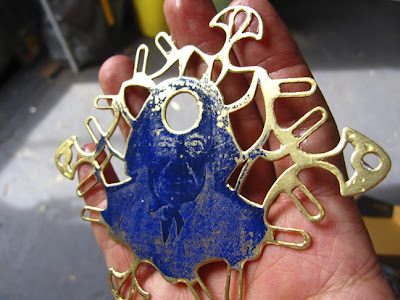I've been back in the studio working on another piece I'd like to share with you. At the time of this writing I'm not positive about the title being used (I'm still working on the piece), but I'll go with it assuming it's going to stay.
The first instigative element for this piece is a spigot handle - I've used many of these to pleasing effect, and I'm all for exploring the form further. Two of the neckpieces I've made with them are among my favorites, but I'll try not to let that weigh on my mind as I work, lest it influence the process.
This is the orientation I've been viewing as the front (though my plan is to make it rotate, leaving either side in front).
I love the receptacle around the perimeter, and plan to use that.
First job is to remove the middle structure, which makes the spigot very heavy.
Now it's about 1/3 the weight.
The spigot will rotate nestled in the jaw of an animal trap.
Free at last. No animals were harmed in the making of this artwork.
An earlier piece I made, The Pearl That Worldlings Covet, employs the trap jaw UNDER the spigot, making the attachment more of a challenge. I'm going with it.
Into the tumbler goes the trap jaw. It'll take at least 24 hours.
Meanwhile, using a copy of the spigot on paper, I begin to design a metal plate that will both embrace the spigot and create a rotational mechanism for the piece to move.
As the drawing comes together, I decide to have a bust etched onto the plate in the center. I need to pick this out now, as it will dictate how to pierce out the interior of the metal.
At a recent etching workshop I was giving (yo, Ginny!), I managed to create my best etched image yet - this prompts me to use another daguerreotype image to be etched onto the plate. I can already tell it'll be the most demanding etching job I'll try. The older man in the right window is my subject.
His silhouette now becomes the focal design in the center of the plate. I like the asymmetry of this.
Oh yeah - now the plate must be cut. This is a thinner gauge brass than I've been using in my previous pieces, so it moves pretty quickly.
Cutting finished.
Checking the fit...
Looks good so far. Now to finish the edges of the plate and polish it.
Ready now to get the face etched on.
Although this PnP Blue etching paper has its drawbacks, it is wonderful to use in this fashion.
Registering the image to the plate.
And transfer complete...now to etch.
I decide, after some hesitation, to use ferric chloride as my etchant, rather than the saltwater etch I've been using of late. This is because I will have more precise control over the depth of etch this way. I'm also etching imagery on the back of the plate as well, so it needs to be suspended in solution.
In the oven, so to speak.
The plate finished and ready - cleaned, patinated and partially shaped - ready to lay aside for later.
In the next part, I'll flip this over and start to realize the other vantage point, as well as consider the trap jaw - and really, shouldn't we all, when it comes down to it?
Take care till next time.
Keith

































I love watching your work come together, thank you SO much for taking the extra time to document your processes
ReplyDeleteYes, thank you for letting us watch you work, it's such a fascinating process! This piece looks very interesting :)
ReplyDeleteMy pleasure - thanks for looking!
ReplyDeleteOMG Keith this looks amazing and the etch is just awesome I love it.Thanks so much for sharing with us all.
ReplyDeleteJen
I *LOVE* watching your pieces take shape. And thanks for sharing it with uis!
ReplyDeleteThanks for sharing Keith. Looking at your work is like being awake in a dream. It helps me see the possibility in so many things.
ReplyDeleteJust amazing, I wish I could look at an animal trap and see such potential.
ReplyDeleteAs always, I'm curious to see the outcome. The etch is wonderful and your saw work, amazing! I'm looking forward to watch the rest of the process.
ReplyDeleteAvery
Your progress on this piece is fascinating to see. I'm eagerly watching to see the finished piece; looks like it will be wonderful! Like others have already said, thank you for sharing this with us.
ReplyDeleteHi, I just wanted to say thank you for posting your processes online. You are a huge inspiration to me and I really enjoy reading your blog. Keep up the excellent work! :)
ReplyDeleteAlso, may I ask the name of the type of hand saw you use to cut the sheet metal?
ReplyDeleteThe saw is a standard jeweler's saw, with a 6" 'throat', for cutting slightly larger work.
ReplyDeleteThanks for all your comments!
I enjoyed your post and to see how your piece is taking a life of its-own.
ReplyDeleteThanks for sharing this with us Keith !!
I will see you next year at Adorn Me !!
Wow! Your process is fascinating! Each step brings this piece closer to something extraordinary. Glad you're taking the time to share~
ReplyDeleteOh, excellent! Thank you for answering my question. Is there a particular type of blade that you use?
ReplyDeleteHi, Keith. Just a note to say how inspirational your posts are. It's like having a mentor -- only it's in silent film! Love it. And, yes, I do think we should consider the jaw -- as mine is often a trap (so to speak) LOL. Hope to see you in Houston in March.
ReplyDeleteI've spent the better part of today reading and looking at your pieces, amazing THANKS for sharing...
ReplyDelete